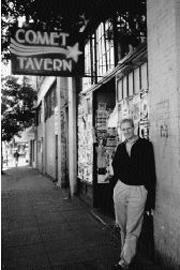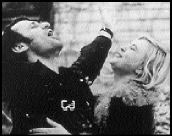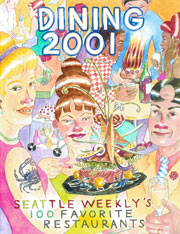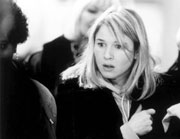TWENTY YEARS AGO this summer, Peter Donahue roared into town. “I was 20 years old, from New Jersey, and I had a drive-away car,” the creative writing professor recalls over the phone from his present home in Birmingham, Alabama. “And Seattle was as far from Jersey as you could get.”
PETER DONAHUE
Starbucks Literary Stage, Alki Room Monday at 3:45pm
Donahue still gets back to the Northwest (he usually makes an annual pilgrimage), but has even more reason to do so this year. His book of short stories, The Cornelius Arms, about the lives of residents in a Denny Regrade apartment building, was published earlier this summer by Seattle’s Missing Spoke Press. After earning a bachelor’s degree from the UW, Donahue moved with his wife to Oklahoma in 1990, where he earned a PhD in creative writing from the University of Oklahoma. From there he began to chronicle the city that, no matter how distant, “I still very much consider home.”
Donahue’s stories introduce a group of tenants who, in their varied, decidedly non-affluent circumstances, define a pre- dot-com city on the verge of overwhelming change. Pursuing odd jobs—some of which Donahue himself did—from delivering medical equipment to collecting butterflies to stacking porn magazines at a newsstand to organizing tenants to scoring drugs, these characters speak with distinct, memorable voices. Together, their stories thread together and ultimately define a specific time in Seattle that has already become something of a memory.
LIKE HIS CHARACTERS, Donahue lived in the Regrade. “Back then,” he says, “it was an incredibly affordable place to live. That’s what struck me about it. I could land in Seattle with a few hundred dollars to my name, get a lease, a place with an extraordinary view. I didn’t have a car, but I could get anywhere I wanted. I was surprised by how easy it was to live there.”
The Cornelius Arms triggers nostalgia, certainly, for a time and place that can’t be recaptured, but its stories deliver a cumulative effect that is quite powerful: Because of how little money the tenants have, each exists at a subsistence level of society that has all but vanished from downtown today. (Just take a look at the current condos on First Avenue.) One example is Mona, an older woman desperate to save her apartment from developers. Although poor, she gives coins to a man begging for change. “She knew that she gave out of fear as much as out of kindness,” Donahue writes. “Not fear of panhandlers, but of her own potential homelessness. . . .”
Does Donahue think Seattle is in danger of losing something essential in this time of dot-com excess? “I think there is that danger,” he says. “There is a kind of move to make Seattle, and especially [the Regrade], antiseptic. . . . People are getting dislocated; they are having to get further and further out to get affordable housing. . . . But at the same time, you can still find the Denny Regrade I write about. Just walking around this summer, there’s still that element down there. And there’s still the old apartment buildings.”*
Literary Picks
The Big Guns—A fitting phallic image for the Big Boys of Bumbershoot. . . . The punk-rock legend behind the tune “People Who Died” and the eloquent diarist responsible for The Basketball Diaries, Jim Carroll just might influence the next Patti Smith or Jello Biafra at this spoken-word performance (Bagley Wright Theater, Sun, 5-6pm). The Montana-based author James Welch demonstrates why he won the 1997 Lifetime Achievement Award of the Native Writer’s Circle, as he reads from his latest work of fiction, The Heartsong of the Charging Elk, about a 19th-century Native American who ditches the reservation for Buffalo Bill’s Traveling Wild West Show (Bagley Wright Theater, Mon, 8:30-9:30pm). David Shields, a Seattle Weekly contributor, creative writing professor at the UW, and the award-winning author of Black Planet: Facing Race During an NBA Season, promises a reading that’s more exciting than any Sonics game (Starbucks Literary Stage, Alki Room, Mon, 3:45-5pm).
Poetry Rogues—Don’t miss San Francisco’s spoken word sass-masters Sister Spit, made up of Sini Anderson, Marci Blackman, Beth Lipstick, and Michelle Tea, the reigning queen of punk-dyke lit (Starbucks Literary Stage, Alki Room, Fri, 3-4:15pm). In a similar, yet quirkier vein, Seattle’s Staggered Thirds wax weird through the talents of Anna Mockler, Gregory Hirschak, and Doug Nufer (Starbucks Literary Stage, Alki Room, Sat, 1-2pm). The Trinidad-born, Harlem-based 1999 National Poetry Slam Individual Champion Roger Bonair-Agard promises to dazzle the disbelievers (Starbucks Literary Stage, Alki Room, Sat, 4:30-5:45pm), while Billy Collins keeps it real, but a bit less rowdy, in a reading from his collection Picnic, Lightning (Bagley Wright Theater, Sun, 9-10pm). If you consider your “I” worthy of others’ eyes, show ’em whatcha got: Take a three-minute-long shot at $100 in BumberSlam (Starbucks Literary Stage, Alki Room, Sun, 8-9pm) or let local entrepreneurial poets-on-demand The Typing Explosion turn your words into art with their vintage typewriters (Festival grounds, Sat, Sun, Mon 3-5:30).
Plus:
* Keith Egawa—Seattle author Egawa seems to have kept a low profile since Madchild Running, his debut novel, was released last fall. A registered member of the Lumni Tribe, Egawa has created a fast-paced, angst-ridden novel that fleshes out the poverty, anger, and hope of the contemporary Native American experience. Starbucks Literary Stage, Alki Room, Fri, 8-9pm
* Amy Schutzer—Taking a break from picking vegetables for a women’s commune in Estaceda, Oregon, Schutzer will read from Undertow, a tale that tracks the relationship between two women who fall in love, quite literally, by accident. The novel received the Astraea Foundation Fiction Fellowship and the Barbara Deming Award, and at the same time managed to pull Calyx press out of dire straits. Starbucks Literary Stage, Alki Room, Mon, 1:15-2:15pm
* Prison Writing Program—In 1989, author Robert Gordon began a nine-year stint conducting writing workshops in Washington state prisons. Subsequently, the author of the novel When Bobby Kennedy Was a Moving Man put his fiction writing career on hold to produce the just-released The Funhouse Mirror: Reflections on Prison, a collection of essays and the occasional short story written by various inmates and Gordon himself. Gordon’s joined by two of the book’s contributors, T.J. Granack (“Welcome to the Steel Hotel: Survival Tips for Beginners”) and Michael Collins (“Seventeen Fist Fights Later”), for a discussion of prisons and the art that occasionally blooms within their walls. Starbucks Literary Stage, Alki Room, Sun, 4:30-5pm
* Shara McCallum—Raised in Jamaica and the US by Afro-Jamaican and Venezuelan parents, Shara McCallum shares The Water Between Us, her book of poetry that relates the exile’s struggle to fit two worlds inside one life. McCallum’s an encyclopedia of imagery, combining creativity with Jamaican folk tales, Greek myths, and biblical stories. Starbucks Literary Stage, Alki Room, Sat, 4:30-5:45pm
DAVID MASSENGILL








